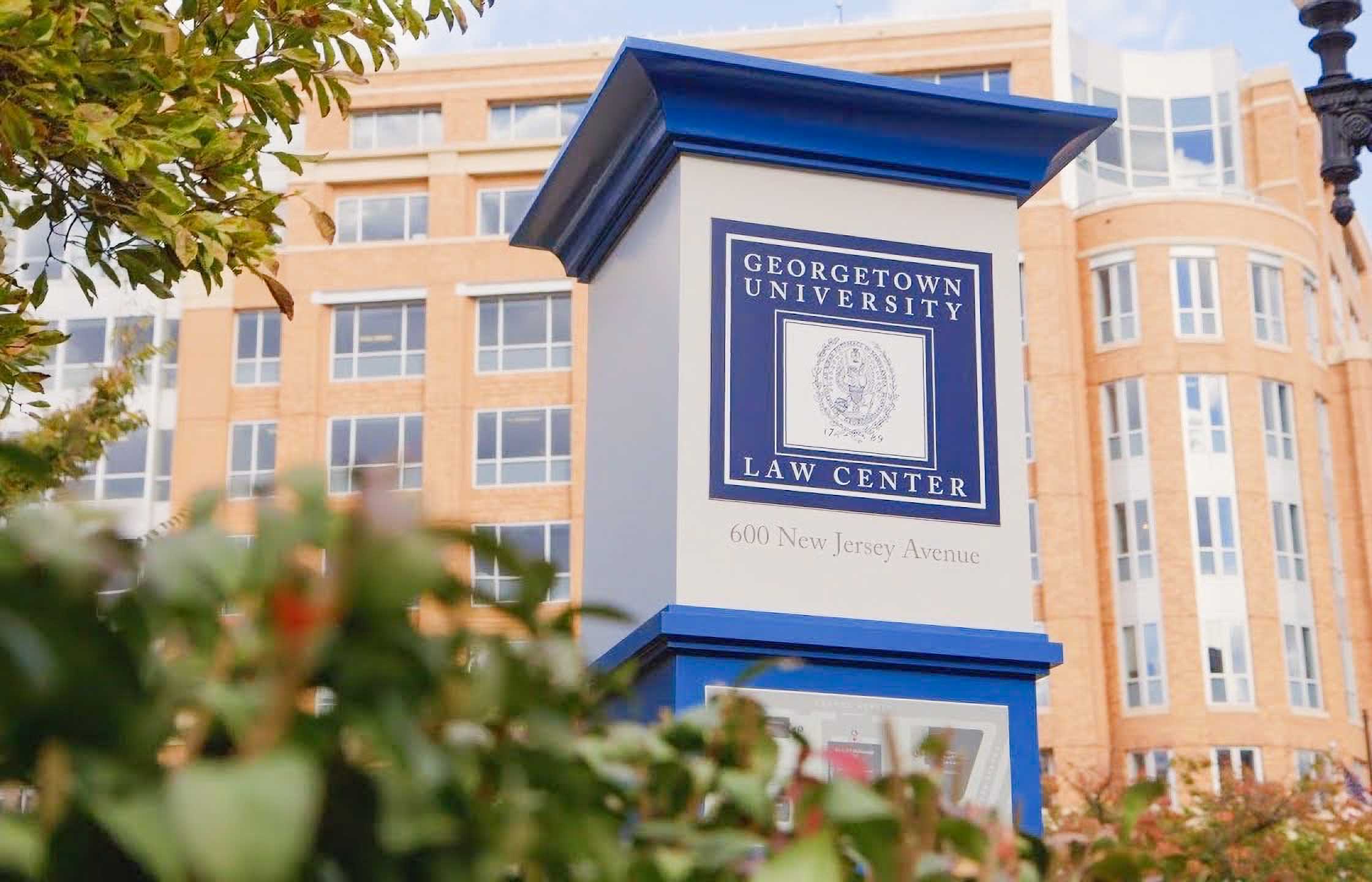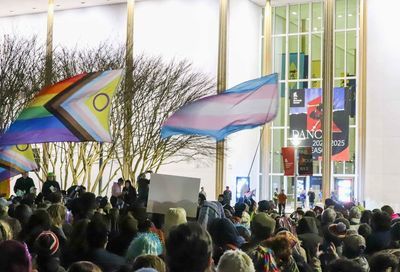Florist who refused to provide flowers for a gay wedding will pay gay couple $5,000
Barronelle Stutzman, who is retiring, says she hopes others will continue the fight against providing services for same-sex weddings.
By John Riley on November 19, 2021 @JRileyMW

A florist who refused to provide flowers for a longtime customer who was marrying his male partner has agreed to settle her case by paying the couple $5,000, following a series of court rulings against her.
On Thursday, Barronelle Stutzman, the owner of Arlene’s Flowers in Richland, Washington, withdrew a petition asking the U.S. Supreme Court to rehear her case after the nation’s highest court previously declined to take up the case in July.
As part of the settlement, Stutzman agreed to pay $5,000 to the couple Robert Ingersoll and Curt Freed. The couple have since said they’ll donate the full amount of the settlement to a local chapter of PFLAG, an LGBTQ advocacy group, and will personally match the donation using their own funds, according to their lawyers with the American Civil Liberties Union.
In a statement, Stutzman’s lawyers with the anti-LGBTQ group Alliance Defending Freedom trumpeted the settlement as a victory of sorts, claiming in a press release that the settlement allows their client to end the lawsuit “without forcing her to act against her religious beliefs or to pay potentially ruinous attorneys’ fees.”
Stutzman, who has since decided to retire and will be handing the shop over to her employees, said she was never forced to “compromise my conscience, or go against my faith,” and hopes that other social conservatives will continue the fight for religious freedom in her stead.
“At one point, those aligned against me suggested that I could keep my shop if I paid a fine and promised to create custom designs for same-sex ceremonies in the future. I refused because I could not betray my conscience,” she said in a statement.
“I also worried about what kind of precedent my ‘paying up’ would set for others facing similar circumstances. But I am willing to turn the legal struggle for freedom over to others.”
Stutzman continued: “So, I’ve paid $5,000 to Rob [Ingersoll] and am passing my legal torch on to other artists — like Lorie Smith of 303 Creative in Colorado, whose case may well be heard by the U.S. Supreme Court this term — and thanking God for the victories He’s so graciously given me.”
She added that she wishes Ingersoll “the very best.”
The case dates back to 2013, when Ingersoll and Freed sued after Stutzman refused to provide them flowers for their wedding. In their lawsuit, they argued that Stutzman’s denial of service violated the Washington Law Against Discrimination, which is supposed to prohibit discrimination in public accommodations against people based on any number of characteristics, including sexual orientation.
But Stutzman claimed that providing flowers for a same-sex wedding would her Southern Baptist beliefs and her “relationship with Jesus Christ.” She also argued that her floral arrangements were “works of art” and being forced to provide them for a wedding that her religious beliefs do not condone would be a violation of her First Amendment right to freedom of expression.
A similar argument was employed by Jack Phillips, the owner of Masterpiece Cakeshop in Lakewood, Colorado, in a 2018 Supreme Court case after he refused to provide a wedding cake for a same-sex wedding.
But Stutzman had much less luck than Phillips. After she refused to admit wrongdoing and settle the case for $2,000, a lower court ultimately ruled against Stutzman in 2015, finding she had broken the Law Against Discrimination.
She appealed the case to the Washington State Supreme Court, which unanimously upheld the lower court’s decision and opined that providing equal service to all customers did not violate her constitutional rights.

Stutzman and her lawyers then appealed the case to the U.S. Supreme Court, which remanded the case back to the Washington State Supreme Court for reconsideration, just in case the decision might have been clouded by anti-religious bias — as the high court claimed occurred when Colorado’s Civil Rights Commission ruled against Phillips Masterpiece Cakeshop case.
But in 2019, the Washington State Supreme Court stood by its earlier decision, finding no evidence of animus towards Stutzman and opining that selling flowers for a wedding “does not inherently express a message about that wedding.”
Stutzman then appealed that decision to the U.S. Supreme Court, which refused to hear the case, thereby allowing the lower court decisions to stand.
Ingersoll and Freed issued a statement expressing satisfaction with the settlement.
“We took on this case because we were worried about the harm being turned away would cause LGBTQ people,” they said in a statement.
“We are glad the Washington Supreme Court rulings will stay in place to ensure that same-sex couples are protected from discrimination and should be served by businesses like anyone else. It was painful to be turned away and we are thankful that this long journey for us is finally over.”
See also:
Advocates: At least 47 transgender Americans lost their lives to violence this year
HRW: To curb anti-transgender violence, address the issues that make trans people vulnerable
Georgetown Law Defies Federal Demand to Eliminate DEI
The dean of Georgetown Law School is pushing back against demands by D.C.'s U.S. Attorney to drop DEI programs and curriculum content.
By John Riley on March 18, 2025 @JRileyMW
The Trump administration continues to push the boundaries of free speech by threatening retaliation against Georgetown Law School if it fails to eliminate any diversity, equity, and inclusion (DEI) programs.
In a "letter of inquiry" dated February 17 but emailed to Dean William Treanor on March 3, Acting U.S. Attorney for the District of Columbia Ed Martin said that a whistleblower informed him that Georgetown Law School "continues to promote and teach DEI," calling such actions "unacceptable," according to The Associated Press.
Martin warned Treanor that his office wouldn't consider any Georgetown Law students for jobs, summer internships, or fellowships until the school dropped its DEI programs.
Yeshiva University Agrees to Recognize LGBTQ Student Club
The Orthodox university has settled a lawsuit brought by organizers of an LGBTQ student group, agreeing to recognize it as an official club.
By John Riley on March 23, 2025 @JRileyMW
Yeshiva University announced that it had reached a settlement with an LGBTQ student-run club that the university, for years, had refused to recognize as an official campus organization.
In the surprise move, the Orthodox Jewish educational institution said that it would end litigation related to its refusal to recognize the group, which it initially claimed was due to religious objections.
As part of the settlement, the club -- formerly known as the Yeshiva University Pride Alliance -- would be renamed "Hareni" and would be allowed to operate with the same rights and privileges guaranteed to other student groups.
A Second Judge Blocks Trump’s Anti-Trans Health Care Orders
A Maryland judge finds that transgender plaintiffs and their families are likely to succeed in proving the orders are unconstitutional.
By John Riley on March 5, 2025 @JRileyMW
A federal judge issued a nationwide order blocking a pair of executive orders from President Donald Trump seeking to criminalize the provision of gender-affirming health care to transgender youth.
U.S. District Judge Brendan Hurson, of the District of Maryland, granted a preliminary injunction to the families of several transgender young adults and adolescents whose access to gender-affirming care was disrupted by Trump's orders. Those families are joined by the pro-LGBTQ advocacy group PFLAG National and GLMA, the country's largest organization of LGBTQ and allied health professionals.
Support Metro Weekly’s Journalism
These are challenging times for news organizations. And yet it’s crucial we stay active and provide vital resources and information to both our local readers and the world. So won’t you please take a moment and consider supporting Metro Weekly with a membership? For as little as $5 a month, you can help ensure Metro Weekly magazine and MetroWeekly.com remain free, viable resources as we provide the best, most diverse, culturally-resonant LGBTQ coverage in both the D.C. region and around the world. Memberships come with exclusive perks and discounts, your own personal digital delivery of each week’s magazine (and an archive), access to our Member's Lounge when it launches this fall, and exclusive members-only items like Metro Weekly Membership Mugs and Tote Bags! Check out all our membership levels here and please join us today!
The Magazine
-
Most Popular
 'Porn Star University' Started by Gay-for-Pay Creator Andy Lee
'Porn Star University' Started by Gay-for-Pay Creator Andy Lee  Utah Bans the Pride Flag
Utah Bans the Pride Flag  Anheuser-Busch Abruptly Ends Sponsorship of St. Louis PrideFest
Anheuser-Busch Abruptly Ends Sponsorship of St. Louis PrideFest  Gay Congressman Chris Pappas Poised to Launch Senate Bid
Gay Congressman Chris Pappas Poised to Launch Senate Bid  Becca Balint Introduces Trans Health Care Bill
Becca Balint Introduces Trans Health Care Bill  The Commanding Style of Nathan Lee Graham
The Commanding Style of Nathan Lee Graham  Gay Porn Star Tim Kruger Dead at 44
Gay Porn Star Tim Kruger Dead at 44  Trump Targets Law Firm for Defending Transgender Rights
Trump Targets Law Firm for Defending Transgender Rights  Texas Man Fires Gun at Relative Who Came Out as Gay
Texas Man Fires Gun at Relative Who Came Out as Gay  Popular Music: Spring Arts Preview 2025
Popular Music: Spring Arts Preview 2025
 Becca Balint Introduces Trans Health Care Bill
Becca Balint Introduces Trans Health Care Bill  Gay Congressman Chris Pappas Poised to Launch Senate Bid
Gay Congressman Chris Pappas Poised to Launch Senate Bid  Utah Bans the Pride Flag
Utah Bans the Pride Flag  3 Million People Could Die Due to HIV Funding Cuts
3 Million People Could Die Due to HIV Funding Cuts  Celebrities Urged to Boycott Hungary Over Pride Ban
Celebrities Urged to Boycott Hungary Over Pride Ban  The Commanding Style of Nathan Lee Graham
The Commanding Style of Nathan Lee Graham  Texas 'Sexual Content' Bill Would Criminalize Literary Works
Texas 'Sexual Content' Bill Would Criminalize Literary Works  Awesome Con Celebrates the Geek in All of Us
Awesome Con Celebrates the Geek in All of Us  Win Tickets to Awesome Con!
Win Tickets to Awesome Con!  Film: Spring Arts Preview 2025
Film: Spring Arts Preview 2025
Scene
Metro Weekly
Washington's LGBTQ Magazine
P.O. Box 11559
Washington, DC 20008 (202) 638-6830
About Us pageFollow Us:
· Facebook
· Twitter
· Flipboard
· YouTube
· Instagram
· RSS News | RSS SceneArchives
Copyright ©2024 Jansi LLC.












You must be logged in to post a comment.